At daybreak, the Botanical Garden was ascream with wild parrots of six different species: orange-winged Amazon, yellow-crowned Amazon, festive Amazon, red-shouldered (Hahn's) macaw, mealy Amazon, and green-rumped parrotlet. A couple of blue and yellow macaws were hollering, too, but these deep-forest birds certainly didn't get there under their own steam. I had my doubts about this festive Amazon, a rare bird in Guyana. What was it doing in a botanical garden/zoo, all by itself?
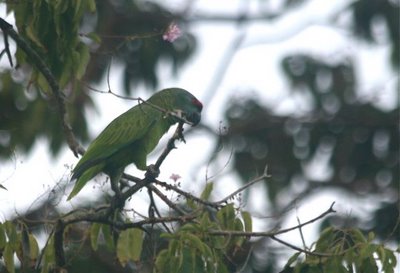 Having seen festive Amazons by the bushel in Brazil, I didn't need to worry about whether to add it to my life list. As if I worried about that stuff in the first place. It was a glorious bird, its colors dampened only by the fact that my camera had spent the night in air conditioning and, along with almost everyone else's optics, was violently objecting to being brought out in the steamy morning heat.
Having seen festive Amazons by the bushel in Brazil, I didn't need to worry about whether to add it to my life list. As if I worried about that stuff in the first place. It was a glorious bird, its colors dampened only by the fact that my camera had spent the night in air conditioning and, along with almost everyone else's optics, was violently objecting to being brought out in the steamy morning heat.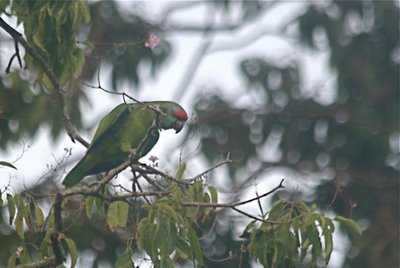 I was frantically wiping the fog off the lens every few seconds, trying to get an acceptable image. I wish I'd been able to show you his scarlet rump, source of his "festive" handle. Lovely blue face, too.
I was frantically wiping the fog off the lens every few seconds, trying to get an acceptable image. I wish I'd been able to show you his scarlet rump, source of his "festive" handle. Lovely blue face, too.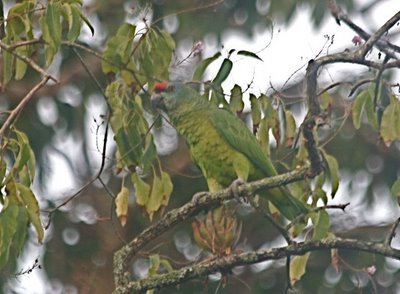 Tropical travel tip from Leica's Terry Moore: Leave your camera in the hotel bathroom and shut the door, and try to keep it close to outside temperature and humidity conditions, or you'll get a nasty surprise on your first morning out. The air will be blue with fog and words.
Tropical travel tip from Leica's Terry Moore: Leave your camera in the hotel bathroom and shut the door, and try to keep it close to outside temperature and humidity conditions, or you'll get a nasty surprise on your first morning out. The air will be blue with fog and words.While befogged, I witnessed a battle between two orange-winged Amazons that looked like something out of one of Liam's dinosaur books. There's always squabbling amongst parrots, even (and especially) mated pairs. The bird with its back to us temporarily has the upper hand, forcing its sparring partner to hang precariously from the perch.
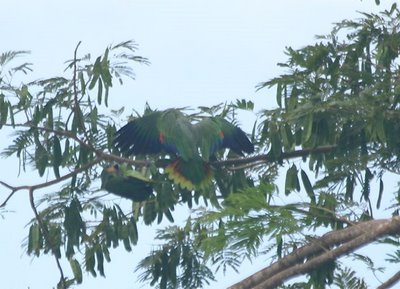 Not so fast!
Not so fast!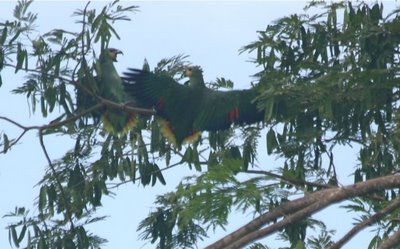 Awk! Awk! Screech! They flash the amazing colors of their wings and tail in battle. Orange-winged Amazons were the most common parrots we encountered. When I say "parrots," I mean here the square-tailed Amazon parrots. The most common psittacine (a group which includes parrots, macaws, parakeets and parrotlets) we encountered in Guyana was the red-shouldered macaw, a small cousin to my beloved Charles (a chestnut-fronted macaw), and subject of two posts to come.
Awk! Awk! Screech! They flash the amazing colors of their wings and tail in battle. Orange-winged Amazons were the most common parrots we encountered. When I say "parrots," I mean here the square-tailed Amazon parrots. The most common psittacine (a group which includes parrots, macaws, parakeets and parrotlets) we encountered in Guyana was the red-shouldered macaw, a small cousin to my beloved Charles (a chestnut-fronted macaw), and subject of two posts to come.Identifying parrots in flight is great fun for me, though a lot of birders throw up their hands. You can do a lot of it by voice--the screeches differ by species. Here is a nice shot showing two species in flight--an orange-winged Amazon on the left, and a yellow-crowned Amazon on the right. See the orange wing speculum on the left hand bird, and the bright red one on the right bird?
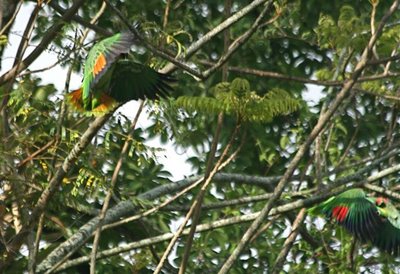 The yellow-crowned Amazon is the Guyanan race of the famous yellow-naped Amazon and "double yellow-headed" Amazon, both stalwarts of the caged bird trade, and famed for their talking ability. The only difference in the three, all members of the superspecies Amazona ochrocephala, is the distribution of the yellow on head, nape, or cheek. Throughout Latin America, A. ochrocephala is referred to as "Loro real," meaning "The real parrot," because it's the best talker and most coveted.
The yellow-crowned Amazon is the Guyanan race of the famous yellow-naped Amazon and "double yellow-headed" Amazon, both stalwarts of the caged bird trade, and famed for their talking ability. The only difference in the three, all members of the superspecies Amazona ochrocephala, is the distribution of the yellow on head, nape, or cheek. Throughout Latin America, A. ochrocephala is referred to as "Loro real," meaning "The real parrot," because it's the best talker and most coveted.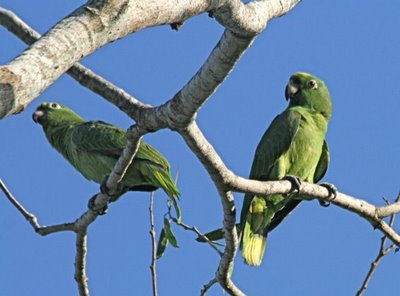 There's a bright surprise of red at the shoulder when the yellow-crowned Amazon takes wing.
There's a bright surprise of red at the shoulder when the yellow-crowned Amazon takes wing.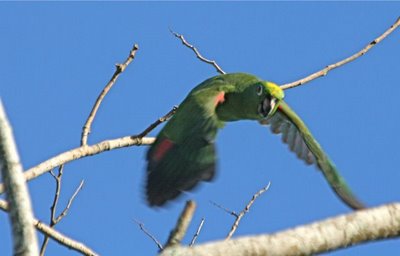 You can tell their calls from those of other parrots because they have a tremolo or yodeling quality, which predisposes them to singing operatic arias to while away their boredom as caged birds. It was wonderful to see parrots self-actualizing with friends and family in the wild. Here's another yellow-crowned Amazon taking off. If you look closely at the extreme left border of the picture, you can see a red-shouldered macaw's red wrist patches and white face as it takes off, too.
You can tell their calls from those of other parrots because they have a tremolo or yodeling quality, which predisposes them to singing operatic arias to while away their boredom as caged birds. It was wonderful to see parrots self-actualizing with friends and family in the wild. Here's another yellow-crowned Amazon taking off. If you look closely at the extreme left border of the picture, you can see a red-shouldered macaw's red wrist patches and white face as it takes off, too.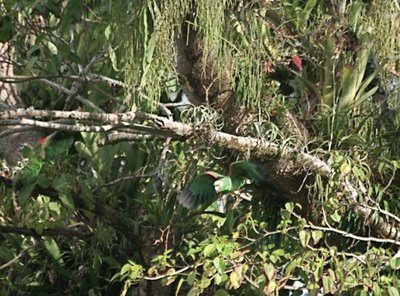 An orange-winged Amazon struts in the sun. My lens has finally cleared enough to make good use of these cooperative parrots.
An orange-winged Amazon struts in the sun. My lens has finally cleared enough to make good use of these cooperative parrots.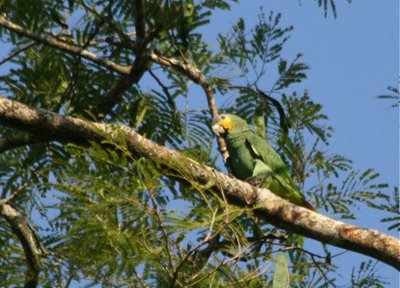 A pair of orange-wingeds discusses their next nesting venture. Looks like his tail's afire!
A pair of orange-wingeds discusses their next nesting venture. Looks like his tail's afire!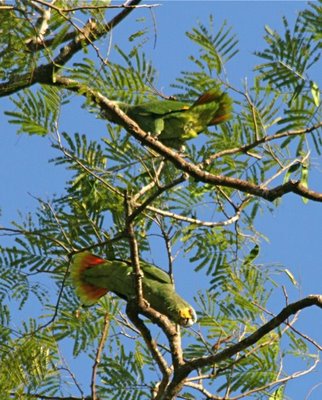 Taking off for the wild blue. Good bye, beautiful free parrot.
Taking off for the wild blue. Good bye, beautiful free parrot. 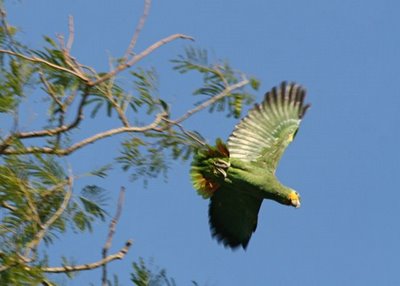 As I write, Charles is rummaging around behind the laptop screen, trying to see if he'll fit beneath my computer. Yesterday he opened my Birds of Venezuela guide to the macaw plate and ran his bill over the images, chuckling. And just now--dammit!!-- bit a notch out of the page. Book damage, some comic relief, a rubbery tongue in my ear, and some warm kisses on his doeskin cheek are about all a macaw is good for in the studio.
As I write, Charles is rummaging around behind the laptop screen, trying to see if he'll fit beneath my computer. Yesterday he opened my Birds of Venezuela guide to the macaw plate and ran his bill over the images, chuckling. And just now--dammit!!-- bit a notch out of the page. Book damage, some comic relief, a rubbery tongue in my ear, and some warm kisses on his doeskin cheek are about all a macaw is good for in the studio.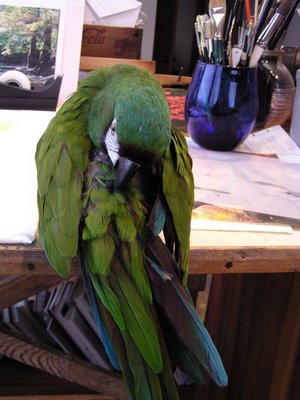
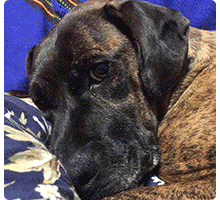





Sunday, December 7, 2008